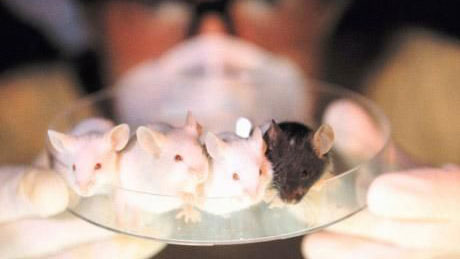Homosexuality: Do genes?
Korean scientists hope to find a link between genes and homosexual phenomena when mouse experiments show that changing some genes in this animal can change the sexual orientation of them.

Female mice become "gay" mice after being genetically altered.Photo: THX.
Scientists from the Korea Institute of Science and Technology have removed a gene called fucose mutarotase (FucM) (a gene that affects estrogen levels) in a female mouse fetus to understand the link. System between genes and sexual activity of rats.
As a result, the scientists found that, during the fetus process, if the female FucM gene is removed, it is possible to turn the female mouse into a 'gay' mouse.
It was observed that female mice removed from the FucM gene showed signs of "refusing" sex with male mice, and they began searching for their partners among the female mice. around.
Since then, the researchers have concluded that the removal of the FucM gene makes the female mouse's behavior gradually approach the behavior of male mice.
Professor Chankyu Park, from the Korea Institute of Science and Technology Development, who led the study, said: 'The brain development of female mice is also altered by genetic changes. This makes their gender closer to the male. '
In fact, scientists have been looking for a long-term relationship between genes and sexual orientation. However, the scientists of the research program also stressed that, in the short term, this experiment has not been able to prove whether there is any connection between genes and homosexual phenomena in humans. ?
Although the change in estrogen hormones causes the female mouse's brain to change in the direction of "masculine", no similar reactions have been found in humans.
At this point, Professor Chankyu Park will continue to study whether this gene will affect human sexual activity. However, Professor Park admits it is not easy to find volunteers to participate in this experiment.
Source: THX
- Darwin's evolutionary model explains male homosexuality
- Men who have a brother have a higher chance of becoming gay
- Homosexuality in the animal world
- Mercury makes white storks become gay
- Homosexuality in ancient Egypt
- 'Gene therapy' Near or far?
- For monkeys, homosexuality is a natural law
- It was the first time a case of sexually transmitted dengue was detected
- Identifying human genes that respond to cosmetics
- African gorillas: 98% of genes are like human genes
- Sponges have up to 70% of human genes
- Having good genes, people will live longer
 Why do potatoes have eyes?
Why do potatoes have eyes? 'Tragedy' the world's largest carnivorous life: Death becomes ... public toilet
'Tragedy' the world's largest carnivorous life: Death becomes ... public toilet Tomatoes were once considered 'poisonous' for 200 years
Tomatoes were once considered 'poisonous' for 200 years Detecting microscopic parasites on human face
Detecting microscopic parasites on human face